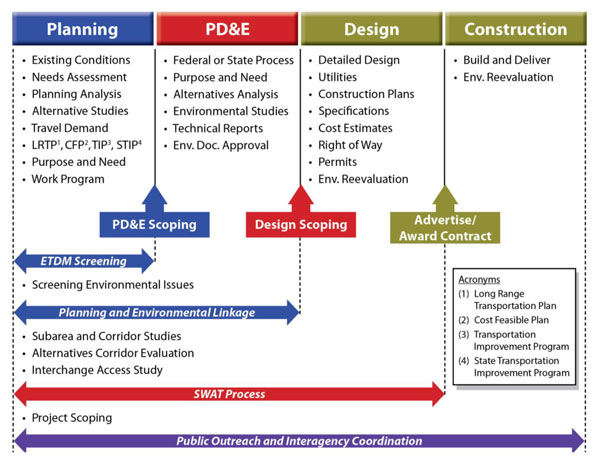A corridor study is a planning project that defines the relationships between a roadway and its adjacent land. Corridor studies are used to:
- Define acceptable levels of access and mobility,
- Determine transportation system needs to support surrounding land uses,
- Consolidate and control access points,
- Identify operational deficiencies and promote operational efficiency, and
- Promote redevelopment of an underperforming corridor.
Corridor studies are an effective tool for assessing existing conditions, developing a preferred future condition, and can offer interim fixes for transitioning corridors as they change. Specific benefits of a corridor study may include:
- Maximization of existing infrastructure
- Improved safety conditions
- Development of coordinated land uses
- Access or mobility improvements
- Air quality improvements through congestion reduction
Components of a Corridor Study
Visioning and Consensus – Establishing a shared vision and consensus allows the community to set project goals and objectives. Understanding needs and developing support from the community is vital to start the planning, design and implementation processes.
Planning and Conceptual Design – Communities should leverage local resources and knowledge to assist in guiding project activities to best meet the needs of their community. Tailoring best practices to match up with local conditions and desires will assist in developing an implementable, successful planning study.
Project Development Process
A project begins by identifying transportation needs or deficiencies through a planning process that prioritizes short- and long-range transportation improvements. The process begins when MPOs, FDOT, and other authorities identify transportation needs and projects that would meet those needs. The following planning products assist in documenting transportation needs: Long Range Transportation Plan (LRTP), Cost Feasible Plans (CFP), Strategic Intermodal System (SIS) Plans, Transit Development Plans (TDPs), Local Government Comprehensive Plans (LGCP), Municipal or Citywide Transportation Master Plans, and corridor planning studies. At the MPO level, project needs are matched and prioritized to available funding for projects in the MPO/LRTPs. At the state level, FDOT develops cost‐feasible plans for the State Highway System (SHS). Priority projects are selected annually from these cost‐feasible plans and are presented to the Florida Legislature as a tentative Five-Year Work Program. Projects included in the Work Program and approved by the legislature may wait for funding for up to five years before significant work can proceed. FDOT coordinates with the various MPOs and local stakeholders throughout the state to develop a vision for the State’s transportation system. This includes the establishment of goals, objectives and policies to sustain and support the growth of the State’s population and economy. Additionally, FDOT provides guidance and technical assistance for transit providers for their TDPs.
During the Planning phase, the purpose and need for the project is established based on identified transportation deficiencies, such as capacity, safety, and travel time reliability. Transportation land use and other planning data are the primary source of information used to establish or define the purpose and need for the project. Corridor studies can be performed within the Planning phase to define project parameters, project definition and the purpose and need for the project. The 56th Street/50th Street Corridor Study is part of the Planning phase of the project development process. Some of the improvements that are recommended based on the findings of this study can be prioritized at the local level or through the FDOT’s Five-Year Work Program; these improvements may include: turn lane improvements, pedestrian and bicycle accommodations, signal retiming, transit stop amenities, etc. On the other hand, larger scale / more cost-intensive improvements may need to be evaluated through subsequent phases of the formal Project Development process. The 56th Street/50th Street Study will help identify the degree of impact associated with each of the proposed short and long-term multimodal transportation improvements.

